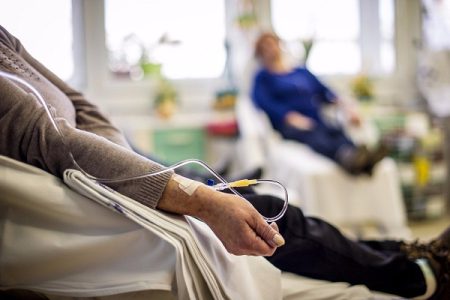Complications of Chemotherapy for Head and Neck Cancer
- Updated on: Feb 10, 2020
- 3 min Read
- Published on Feb 10, 2020

Salivary gland cancer is a type of head and neck cancer that involves abnormal growth of salivary glands cells. The abnormal growth may form a mass of tissue called tumor. The tumor can be cancerous or benign.
Salivary gland cancer cells may spread to the other organs through the blood or the lymphatic system.
What is Chemotherapy?
Chemotherapy is a type of therapy or a treatment for cancer that uses drugs to kill cancer cells. It works by stopping or slowing the growth of tumor cells, which grow and divide very quickly.
In most of the cases, chemotherapy drugs enter the bloodstream and travel throughout the body to reach cancer cells and tissues. Sometimes chemotherapy is delivered directly at the tumor site rather than via bloodstream. Read more about chemotherapy for cancer.
Why is Chemotherapy Given to Cancer Patients?
- The best way to get rid of the cancer
- When treatments are not enough on their own to get rid of the cancer, chemo helps
- It is also given before surgery to shrink a tumor
- After surgery, along with radiation therapy, it helps reduce the risk of the cancer returning
Does Chemotherapy Cause Complications in Head and Neck Cancer?
Chemotherapy is not the preferred treatment option for salivary gland cancer or other head and neck cancers. It is mostly used to treat later-stage cancer or to relieve symptoms and to improve quality of life.
The complications of chemotherapy usually depend on the type and dose of drugs and how it is administered.
Some of the Chemotherapy Complications
- Hearing loss
- Nausea and vomiting
- Mouth sores
- Increased chances of infections
- Easy bruising or bleeding in the mouth
- Fatigue
- Kidney problems
- Rashes
- Neuropathy
- Loss of appetite
- Nausea and vomiting
- Diarrhea
- Low blood counts
Chemotherapy in combination with radiotherapy is usually the preferred treatment option for advanced head and neck cancers. Chemotherapy sometimes can also be given before radiotherapy to shrink the tumor and to make radiotherapy more effective.
What is Radiation Therapy?
Radiation therapy also known as radiotherapy is used to kill or damage cancerous cells with the help of radiations. The radiations are very carefully targeted to cancer so that they cause minimum harm to the healthy tissues located near the site of cancer.
Radiation therapy is preferably used in the treatment of salivary gland cancers, pharyngeal and laryngeal cancers, to preserve some of the important functions such as speech, swallowing and breathing.
The aim of radiation therapy just after surgery is to remove cancerous cells that have not been removed during surgery.
Radiation Therapy Procedures
External beam therapy (EBT):
This type of method is used in delivering a beam of high-energy x-rays or proton beams to the location of the tumor.
The radiation beam is generated outside the patient and is targeted at the tumor site. These radiation beams destroy the cancer cells.
Intensity-modulated radiation therapy (IMRT):
High-precision radiotherapy is the advanced mode that utilizes computer-controlled x-ray accelerators to deliver precise radiation doses to a malignant tumor or specific areas within the tumor. The dose of radiation therapy is designed to conform to the three-dimensional shape of the tumor.
Possible side effects and Complications of Radiation Therapy or Chemoradiation for Head and Neck Cancers
There are many oral complications caused by radiation therapy, which may include:
- Dry mouth
- Inflammation and ulceration in the mucous membranes
- Chronic sclerosing sialadenitis
- Mouth infections (Candidiasis)
- The growth of fibrous tissue in the mucous membrane
- Different types of gum diseases and tooth decay
- Tissue breakdown in the area receiving radiation
- Breakdown of bone in the area receiving radiation
- Muscle fibrosis because of radiations
- Difficulty in swallowing
- Taste dysfunction
More: Familial Predisposition For Salivary Gland Cancer
More: In future, salivary glands can be grown in laboratory
How Can These Oral Complications be Prevented?
Management of oral complications of cancer therapy includes patient education, initiation of pre-treatment interventions and management of lesions.
Care needs to be preventive and therapeutic to minimize the risk for oral complications.
Some of the preventive measures are:
- Reducing the incidence and severity of oral mucositis
- Improving infection management
- Good dental hygiene can help in decreasing and preventing oral complications
- Eating a well-balanced diet helps the body to stand the stress of cancer treatment and also helps in maintaining energy to fight against infection and also helps in rebuilding the tissues.
Chemoradiation Therapy
Chemoradiation is the administration of chemotherapeutic drugs during radiation therapy. The treatment is considered the standard of care in the following circumstances:
- Salivary gland cancer that cannot be completely removed with surgery
- Surgery followed by chemoradiation for patients who have had their cancer completely removed by surgery but are at high risk for recurrence
- For patients with the locally advanced larynx and oropharynx cancer patient to preserve speech and swallowing abilities












